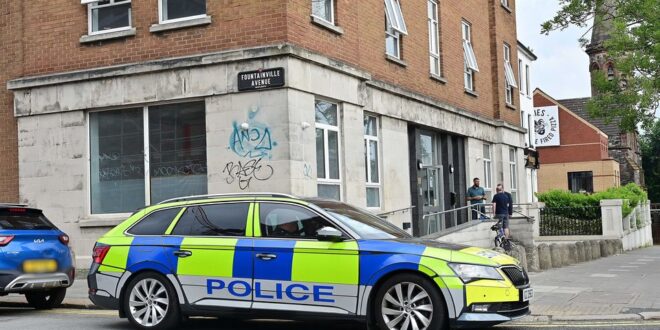Police have arrested a 34-year-old man under terrorism legislation following an incident at the Belfast Islamic Centre on University Road. The attack occurred shortly after 10 p.m. on Monday night, prompting a swift emergency response and subsequent investigation into what authorities are treating as a potential hate-related act.
According to officials, security personnel at the centre became suspicious of the man’s behavior and prevented him from entering the building on several occasions. The individual then moved to the side of the premises, where he broke a window using a brick and threw an incendiary device inside. At the time, approximately 30 men were in the mosque for evening prayers, with several women also present in the adjoining facilities.
Evacuation and Bomb Disposal Response
Police arrived within minutes of the alarm being raised and arrested the suspect at the scene. The entire building was evacuated and surrounding areas cordoned off. The British Army’s Explosive Ordnance Disposal (EOD) team later examined and safely removed the item thrown into the centre.
Representatives of the Belfast Islamic Centre have stated that the situation could have resulted in significant casualties had the suspect gained entry or had the device exploded immediately upon impact. Despite the severity of the incident, the centre reopened the following day, reaffirming its commitment to remaining operational and welcoming.
The Islamic Centre is one of Northern Ireland’s most diverse institutions, representing over 11,000 members from more than 40 nationalities. Community leaders emphasized that they would not be intimidated by the attack and urged members of the public to continue attending prayers and events as usual.
Community Response and Political Condemnation
Kashif Akram, a member of the centre’s Executive Committee, described the incident as deeply disturbing for those inside. He praised the quick-thinking of the security team and stressed that the outcome could have been far worse. Akram reiterated that the community would not be cowed by acts of intimidation and encouraged increased attendance as a form of collective solidarity.
Local and regional political figures strongly condemned the attack. South Belfast Alliance MLA Paula Bradshaw stated that the incident did not reflect the diversity and inclusivity of the area. She expressed gratitude to police and to a passer-by who assisted during the event, citing them as representative of the true spirit of the city.
Sinn Féin MLA Deirdre Hargey called the incident an act driven by hatred and warned that such behavior promotes fear and division, particularly among individuals who have sought safety and stability within the community. She urged political representatives across all parties to unite in denouncing acts that target places of worship.
Green Party Councillor Áine Groogan also spoke out, labeling the act as cowardly and vicious. She acknowledged the trauma experienced by those present and highlighted the broader context of rising racially motivated violence in Northern Ireland. Groogan called on political leaders to reconsider the impact of rhetoric surrounding migration and warned that ambiguous statements could be exploited to justify hate.
Ongoing Investigation and Broader Implications
Authorities continue to investigate the incident, which is being handled under counter-terrorism procedures. While no injuries were reported, the psychological impact on those inside the mosque and the wider Muslim community has been considerable. Security measures at the centre are being reviewed, and support services have been made available for those affected.
Community organizations and advocacy groups have called for renewed efforts to combat hate crimes and improve protection for minority communities. The incident has reignited discussions around the responsibilities of public figures and media platforms in shaping discourse that influences public sentiment toward immigration, diversity, and multiculturalism.
As the investigation proceeds, the Belfast Islamic Centre has pledged to maintain its programming and religious services, framing continued attendance as both an act of faith and defiance in the face of attempted intimidation.
 The Daily Star Ireland
The Daily Star Ireland

